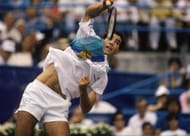The last Grand Slam of the year, the US Open, is the oldest Grand Slam event after Wimbledon. With its first edition in 1881, the US Open has been held every year since.
After 93 years on grass, the tournament transitioned to clay for three seasons (1975-77) before moving to a hardcourt surface called "DecoTurf" in 1978.
American Jimmy Connors is the only player to have won the US Open on all three surfaces. He is also one of the most successful players in the history of the tournament, having won five titles.
The US Open is the only Grand Slam of the year which employs a conventional tie-break (first to seven points with a difference of two) at six games all in the fifth set.
Roger Federer has the Open Era record of most consecutive titles at the event (5). Novak Djokovic, the defending champion and Ivan Lendl are the only two players to have come second best in five finals at the US Open.
The trio of Lendl, Sampras and Djokovic, with 8 apiece, have played the most title matches at the US Open. Lendl is the only men's singles player in the Open Era to play 8 consecutive US Open finals.
Let us have a look at the most successful men's singles players at the US Open in the Open Era:
#4 John McEnroe (4 titles)

John McEnroe has won 4 titles at the US Open from 5 title matches.
The American beat Vitas Gerulaitis in the 1979 final to win his first Grand Slam title and the first of his four titles at his home Slam.
McEnroe beat Bjorn Borg in the 1980 title match to become the first player in the Open Era to successfully defend his US Open title. The pair clashed again in the final the next year where McEnroe beat Borg in New York for the second year in a row to complete a 'three-peat'.
In 1984 McEnroe dropped only eight games in the final against Ivan Lendl to win his fourth title at the tournament.
The following year, however, Lendl returned the favour by beating the American in straight sets to win the first of his three consecutive titles at the US Open.
#3 Jimmy Connors (5 titles)

Jimmy Connors won the first of his five titles at the US Open in 1974 by dropping only two games against 1970 champion Ken Rosewall of Australia. It was the last edition of the US Open on grass as the tournament transitioned to clay the next season.
After being thwarted by Orantes in the 1975 final, which was also the first US Open to be played on clay, Connors won his second title at the tournament by beating Swede Bjorn Borg in four sets in the 1976 title match.
Guillermo Vilas beat the defending champion Connors in the last US Open to be played on clay in 1977, before the tournament moved to hardcourt and to its present venue of Flushing Meadows.
Connors returned to the US Open final for a fifth consecutive year in 1978, where he beat Borg in the first US Open Championships to be played on hardcourt. The win made Connors the only player to triumph at the US Open on all three surfaces.
The American beat Lendl in successive US Open finals in 1982 and 1983 for his fourth and fifth titles respectively at the tournament.
#2 Pete Sampras (5 titles)

Pete Sampras became the youngest ever winner of the US Open when he beat his compatriot Andre Agassi in straight sets in the 1990 final. After falling short against Edberg in the 1992 title match, Sampras won his second US Open title in 1993 by beating Frenchman Cedric Pioline in the final.
Two years later, the American beat Agassi for the second time in as many US Open finals between the pair to lift his third title at the last Grand Slam of the year. In 1996 Sampras had his first successful US Open title defence when he beat compatriot Michael Chang in straight sets in the final.
After a four-year hiatus, Sampras was back in a US Open final in 2000 where he went down to Russian Marat Safin. Sampras endured back-to-back US Open final heartbreaks the next year when Lleyton Hewitt thwarted the American.
At the 2002 US Open, Sampras tied Lendl's Open Era mark of 8 US Open finals and went on to beat his compatriot Agassi for the third time in a US Open final to go level with Connors' record of 5 US Open titles. It turned out to be the last professional match in the career of the then-record 14-time Grand Slam champion.
#1 Roger Federer (5 titles)

With 5 titles, Roger Federer is one of the most successful players at the US Open, along with Connors and Sampras. In his fifth appearance at the tournament, Federer lifted his first US Open title and his second Grand Slam title by beating 2001 champion Lleyton Hewitt 6-0, 7-6(3), 6-0.
It was the first instance of a double bagel in a US Open final and the most lopsided US Open title match in the Open Era since Connors dropped only two games against Rosewall in the 1974 final.
Federer successfully defended his US Open title the next year by winning a four-set final against American Andre Agassi. The Swiss beat 2003 champion Andy Roddick in the 2006 final to become the first player since McEnroe (1981) to win three successive US Open titles.
Federer went past McEnroe's record in 2007 when he beat 20-year-old Serbian Novak Djokovic for his fourth straight title at the US Open and the Swiss completed a first 'five-peat' at the US Open by beating Andy Murray in the 2008 final to win his fifth consecutive US Open.
The Swiss recorded a staggering 40th consecutive match win at the US Open in 2009 but was thwarted by Argentinian Juan Martin del Potro in a five-set final.
Federer returned to the US Open final in 2015 but his second attempt to go past Connors' and Sampras' tallies of 5 US Open titles was ended by Novak Djokovic in a four-set defeat.
.
Who Are Roger Federer's Kids? Know All About Federer's Twins
